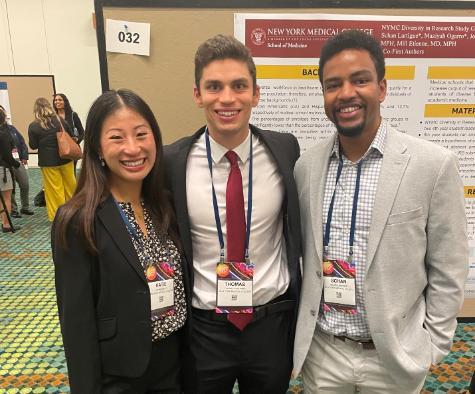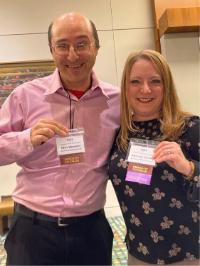
SOM Students Showcase NYMC Diversity and Inclusion-Related Programs
AAMC Conference Offers SOM Students Opportunity to Showcase NYMC Diversity and Inclusion-Related Programs

School of Medicine (SOM) Class of 2024 students Schan Lartigue, Thomas Gagliardi and Katherine Lo had the opportunity to showcase New York Medical College’s (NYMC) diversity and inclusion-related programs aimed at increasing research related to addressing health inequities, supporting the success of students underrepresented in medicine and combating implicit bias during the AAMC Learn, Serve, Lead Conference, held in Nashville, Tennessee, in mid-November.
NYMC’s Diversity in Research Study Group was the focus of Lartigue’s presentation. The group, which began last year with the goal of increasing student involvement in research related to diversity and inclusion, has now grown to include over 50 students. Students learn how to generate a hypothesis, study design and methods, data analysis and abstract preparation, as well as training and mentorship on the IRB submission process. Each project is spearheaded by one student who then recruits fellow students to be involved in data collection, data analysis and construction of the manuscript. To date, the group has been quite successful, with students presenting their work regionally, nationally, and even internationally.
“It was a great experience to represent NYMC with my peers and have our work recognized by the medical community,” said Lartigue, who also presented on the impact of a medical student-led traumatic brain injury support group at the conference. “Jumping from conversation to conversation with the other attendees, whether they were medical students, academic deans or physicians, it felt special to be a part of a community that truly sought to learn from one another and share ideas to bring back for the betterment of their institutions.”
Outcomes of NYMC’s Pre-matriculation Program (PMP), which was launched in 2021, was the subject of Gagliardi’s presentation. “Matriculation to medical school is a challenging process for everyone, and it poses greater challenges for some students including those from historically underrepresented groups, non-traditional students and first-generation students,” said Gagliardi. The research presented at the AAMC conference represents data from the first year of the implementation of the PMP program at NYMC, which included demonstrated early successes, including improvements in students' self-perceived preparedness and better academic performance and more students taking on class leadership roles.
“After setting up our poster, I was immediately greeted by dean after dean from various medical schools,” said Gagliardi. “Many of these deans had come to the session specifically to learn about our PMP and compare it to the approaches they used in their PMPs. At times, there was a small crowd listening to the 90-second oral presentation I had prepared. Much of the time during the poster session was taken up by collaborative discussion with the deans who wanted to bounce ideas off of each other and I came away with great ideas for the future of NYMC's PMP.”
Lo presented on behalf of the NYMC Transformative Educational Leadership Program (TELP), sharing details regarding the curricular elements, learning objectives and participant outcomes from the inaugural implicit bias and microaggression training held at NYMC this summer. “Initiatives aimed at improving recognition and mitigation of implicit bias have been of increasing interest in the medical community, as studies have indicated the negative effects of implicit bias on patient-provider relationships for patients of marginalized groups,” said Lo. “Frequently, implicit bias training emphasizes skill development through didactic lectures and case-based learning, however, few published curricula provide students with opportunities to practice communication behaviors in controlled clinical settings with peer-led, post-session discussion.” The TELP program training includes a standard lecture followed by standardized patient encounters, where students can employ the frameworks they learned during the lecture.
“At the conference, I had the invaluable opportunity to not only share this important work with the larger medical community, but to also learn about other initiatives aimed at improving diversity, inclusion and belonging at other medical schools and institutions,” said Lo. “Our training stirred a lot of interest among poster presentation attendees, and I was encouraged by the number of students and deans who expressed interest in implementing similar training at their institutions.”
 During the conference, Katharine Yamulla, M.A., (right) senior director of competency-based assessment and clinical skills education and director of the Clinical Skills and Simulation Center, put NYMC on a national stage as co-chair of the doctors of clinical skills (DOCS) annual meeting, which included a full day of robust programming – plenary session, business meeting, workshops, poster presentations and networking opportunities. Founded in 2011, the purpose of the Directors of Clinical Skills Education (DOCS) is to build a cohesive and productive international consortium of educators who direct clinical skills education for medical students. Yamulla, who was elected to the Executive Council of DOCS in 2021 and is also the Program Planning Committee co-chair, co-presented the peer-reviewed workshop, “More Than Just The Numbers: Challenges In Competency Based Assessment.”
During the conference, Katharine Yamulla, M.A., (right) senior director of competency-based assessment and clinical skills education and director of the Clinical Skills and Simulation Center, put NYMC on a national stage as co-chair of the doctors of clinical skills (DOCS) annual meeting, which included a full day of robust programming – plenary session, business meeting, workshops, poster presentations and networking opportunities. Founded in 2011, the purpose of the Directors of Clinical Skills Education (DOCS) is to build a cohesive and productive international consortium of educators who direct clinical skills education for medical students. Yamulla, who was elected to the Executive Council of DOCS in 2021 and is also the Program Planning Committee co-chair, co-presented the peer-reviewed workshop, “More Than Just The Numbers: Challenges In Competency Based Assessment.”

